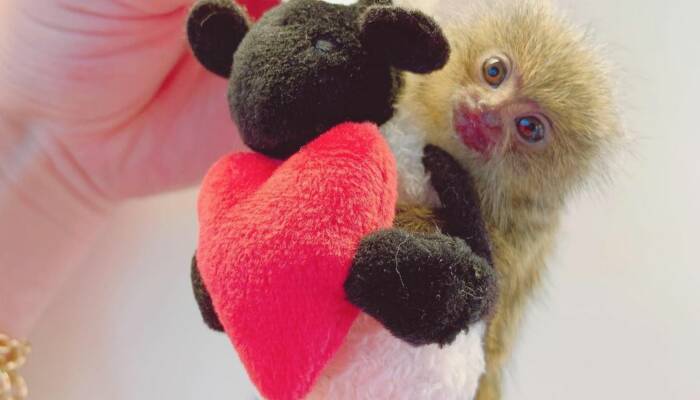Description
Kinkajou for Sale at Ranch of Exotic Breeds
Are you looking to add a unique and fascinating exotic pet to your family? Look no further than the kinkajou! At Ranch of Exotic Breeds, we specialize in providing healthy, well-cared-for kinkajous for sale. These tropical treasures are not only adorable but also incredibly intelligent and social creatures. In this comprehensive guide, we’ll explore everything you need to know about kinkajous, from their origin and care requirements to frequently asked questions and nutrition tips.
Origin of the Kinkajou
The kinkajou scientific name (Potos flavus), also known as the “honey bear,” is a rainforest mammal native to Central and South America. They belong to the Procyonidae family, which includes raccoons and coatis. Kinkajous are arboreal, meaning they spend most of their lives in trees, and they are primarily found in tropical forests from southern Mexico to Brazil.
These nocturnal creatures have adapted to life in the treetops, with prehensile tails that act as a fifth limb, allowing them to grip branches and navigate their environment with ease. Their name, “kinkajou,” is derived from the French word quincajou, which originally referred to the wolverine.
They are small, furry mammals with golden-brown fur, large eyes, and a long, slender tail. They typically weigh between 3 to 10 pounds and measure about 16 to 24 inches in length, with their tail adding an additional 15 to 22 inches.
Personality and Behavior
They are known for their playful, curious, and affectionate nature. They are highly social animals that form strong bonds with their human caregivers. However, they can be shy and require patience and gentle handling to build trust.
These animals are nocturnal, meaning they are most active at night. During the day, they sleep in tree hollows or cozy nests. In captivity, they thrive in environments that mimic their natural habitat, with plenty of climbing opportunities and mental stimulation.
Lifespan
With proper care, They can live up to 20-25 years in captivity, making them a long-term commitment for potential owners.
Kinkajou Care Guide
Owning a kinkajou is a rewarding experience, but it requires dedication and knowledge to ensure their well-being. Here’s what you need to know about caring for a kinkajou:
Housing
They need a spacious enclosure that allows them to climb and explore. A large, multi-level cage with branches, ropes, and platforms is ideal. They also require a cozy nesting area where they can sleep during the day kinkajou facts.
Diet and Nutrition
In the wild, They are omnivores with a diet consisting mainly of fruits, nectar, and insects. In captivity, their diet should include:
- Fresh fruits (e.g., bananas, apples, grapes, and melons)
- Vegetables (e.g., sweet potatoes and leafy greens)
- Protein sources (e.g., cooked eggs, insects, or small amounts of lean meat)
- Occasional treats like honey or nectar
Avoid feeding them processed foods, dairy, or sugary snacks, as these can harm their health.
Enrichment and Exercise
They are active and intelligent animals that need mental and physical stimulation. Provide toys, puzzles, and climbing structures to keep them entertained. Regular playtime outside their enclosure is also essential for their well-being.
Health and Veterinary Care
Regular check-ups with an exotic animal veterinarian are crucial to monitor your pet health. Common health issues include dental problems, obesity, and parasites. Ensure they receive vaccinations and preventive care as recommended by your vet.
Frequently Asked Questions (FAQ)
1. Are They good pets?
They can make wonderful pets for experienced exotic animal owners who understand their needs. They are social, affectionate, and playful but require a significant time commitment and specialized care.
2. Are They legal to own?
Laws regarding their ownership vary by location. Always check your local regulations before purchasing a kinkajou.
3. Do They bite?
They are generally gentle but may bite if they feel threatened or scared. Proper handling and socialization can minimize this risk.
4. Can They be potty trained?
While They can be trained to use a designated area, they are not as easily potty trained as dogs or cats. Patience and consistency are key.
5. How much does it cost?
The price of a kinkajou Small pets for sale can range from 1,000to3,000, depending on factors like age, health, and breeder reputation.
Nutrition Tips for Kinkajous
A balanced diet is essential for your kinkajou’s Small pets for sale health. Here are some tips to ensure they receive proper nutrition:
- Offer a variety of fresh fruits and vegetables daily.
- Provide protein sources like insects or cooked eggs 2-3 times a week.
- Avoid foods high in sugar, salt, or fat.
- Ensure they have access to clean, fresh water at all times.
At Ranch of Exotic Breeds, we offer healthy, hand-raised Exotic animals for sale such as kinkajous for sale. Each of them comes with a health guarantee and a care guide to help you provide the best possible home for your new pet. Our pets are socialized, well-cared-for, and ready to become a beloved member of your family.
Why Choose Ranch of Exotic Breeds?
When you purchase a kinkajou from Ranch of Exotic Breeds, you’re not just buying a pet – you’re gaining a lifelong companion. We are committed to the well-being of our animals and provide ongoing support to ensure a smooth transition for both you and your new kinkajou.
Conclusion
They are extraordinary animals that bring joy and excitement to any household. With their playful personalities and unique appearance, they are sure to capture your heart. At Ranch of Exotic Breeds, we are dedicated to helping you find the perfect Exotic animals such as kinkajou and providing the resources you need to care for them properly.
Ready to welcome one into your life? Contact us today to learn more about our available pets for sale and start your journey into the world of exotic pets!






Reviews
There are no reviews yet.